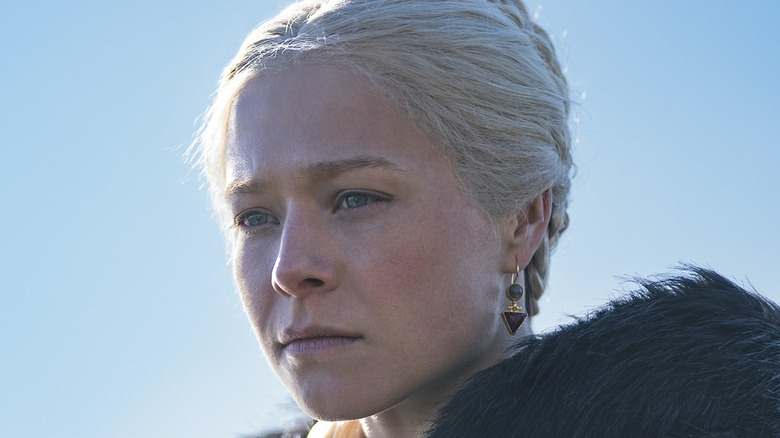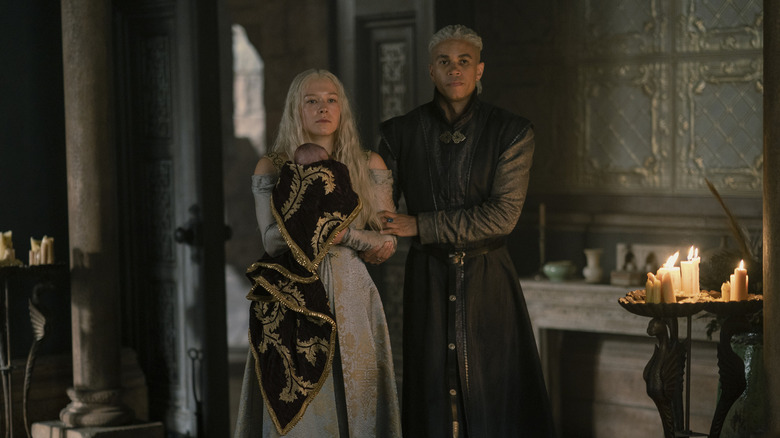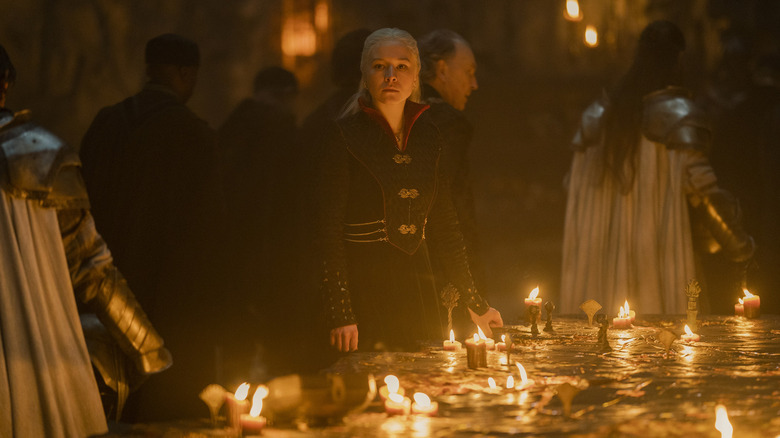House Of The Dragon's Emma D'Arcy Praises Rhaenyra's Bodily Autonomy In That Brutal Birthing Scene
"Game of Thrones" had gruesome scenes like the Red Wedding, depictions of torture, and blood and guts for days — and now, its sequel and spin-off, "House of the Dragon," is showing a whole new form of gore.
From the very first episode, where a woman dies during a dangerous birth that requires a C-section clearly meant to sacrifice the mother for the baby's health, "House of the Dragon" hasn't exactly shied away from depicting extraordinarily graphic childbirth. Fast forward to the show's sixth episode, "The Princess and the Queen," which introduces several new actors after a ten year time jump, and the first time we see Princess Rhaenyra Targaryen (Emma D'Arcy) as an adult, she's deep in the throes of childbirth with her third son, and it's not even the last on-screen labor Rhaenyra will endure throughout the season.
In the aftermath of the first season finale, Emma D'Arcy — who is non-binary and uses they/them pronouns — opened up about that last childbirth scene, and revealed that they actually found it really empowering. Here's what D'Arcy had to say about the devastating scene where Rhaenyra loses her only daughter.
Emma D'Arcy said this childbirth scene was really about bodily autonomy
After learning that her father, King Viserys I (Paddy Considine), has died and his widow Alicent Hightower (Olivia Cooke) has hastily installed their son Aegon II (Tom Glynn-Carney) onto the throne, Rhaenyra is devastated — and it affects her physically. After going into labor months before she's due, she tragically delivers a clearly non-viable fetus in one of the series' most brutal scenes to date.
Speaking to GQ, D'Arcy owned the scene completely, explaining why Rhaenyra refused help from any servants and undertook this harrowing moment alone. "I don't know how contentious this is going to be, but the most important thing for me about the birth in episode 10, is that... She has a fear that begins when she loses her mother," they told the outlet. "And that's one of either dying in childbirth, and/or being incapacitated by childbirth by being forced to bear children within this system. Simultaneously, she lives in anticipation of this call to the throne when her father dies. But she's in the worst-case scenario, in that she is fundamentally incapacitated at the same point as being told 'your father's dead, the throne is yours, and you've been usurped.'"
"The advice Rhaenyra is receiving is to have patience, in the hope of preventing the child being stillborn or preventing harm to the child," they continued. "And she ignores the advice, seeking instead to get this body out of her. And I think it's really fundamental, and it will be possibly divisive, but ultimately I think she chooses her own bodily autonomy. She prioritises her own bodily autonomy. She literally says in the scene, like 'get it out.'"
Are the childbirth scenes in House of the Dragon too much?
When asked if they were aware of some of the backlash surrounding the grisly childbirth scenes — two separate women died in childbirth in their very first episodes — D'Arcy addressed the question head on.
"I haven't seen loads of it to be honest," D'Arcy said. "But I take real issue with the idea that we shouldn't see women in labour depicted with gritty realism, and blood, and placentas. Especially on a show where part of its USP is big, gory battle sequences. What it feels like is that we want women to conform to a certain image. Which is interesting, insofar as acting is concerned, because, there's also a lot of fun to be had getting to do the big physical, physically demanding sequences. And it's interesting that maybe sometimes that is not afforded to female characters."
The first season of "House of the Dragon," with all its gory moments, is streaming on HBO Max now.


